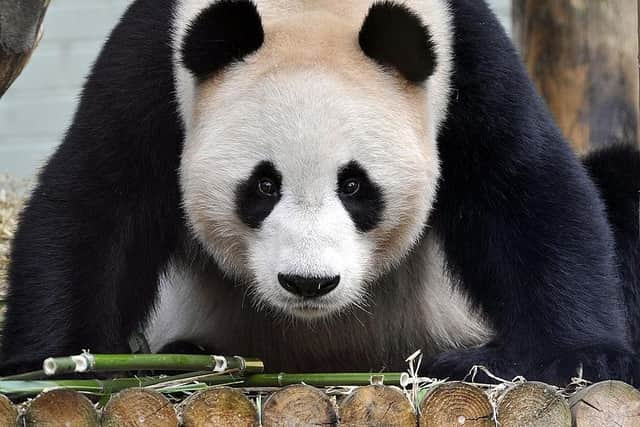Should the UK be following Liz Truss's lead and re-designating China as a formal threat?
The visit, by premier Li Keqiang, came in 2011 – the same year Scotland became the first UK nation in 17 years to be granted the loan of two of China’s most precious commodities – giant pandas.
The ten-year lease, to host Yang Guang and Tian Tian at Edinburgh Zoo, was extended last year, while trade between the two countries has continued to grow in the decade since the pandas’ arrival.
Advertisement
Hide AdAdvertisement
Hide Ad"Scotland is the first stop in my British visit,” Mr Li said at the time. “Sino-British relations have seen smooth development for a long time, and friendly co-operation between China and Scotland has also been in constant development.”


However, recent months have seen an end to the “golden era” of relations enjoyed by the UK and China over the past decade.
Allegations of human rights abuses – such as those detailed in a long-awaited report released this week by the United Nations into the Chinese government’s arbitrary detention of Uighurs and other ethnic groups in the western region of Xinjiang – as well as tensions over Taiwan and Hong Kong and fears over data mining have sparked a suggestion from Westminster’s foreign secretary – and potential prime minister – Liz Truss that she could reopen an integrated review.
While the review, published last year and setting out British priorities in diplomacy and defence over the next decade, labelled China as a “systemic competitor”, Ms Truss now apparently plans to re-categorise the country as an official “threat”, elevating it to the same category as Russia.
The stance is at odds with that adopted by other Western countries, such as the US and European Union nations.


If Ms Truss does take a tough line on Beijing, the move could have serious implications for Scotland too, reversing years of economic partnerships worth tens of millions a year. According to Scottish Government data, in 2018, Scotland sold £635 million worth of goods to China. This totalled 1.9 per cent of Scotland’s total international exports and was a rise of 8.7 per cent since 2013.
The Scottish Government’s language around China has also changed in recent months.
“The focus of the Scottish Government’s policy on China remains to support political, economic, cultural, education and social relationships with the people China in keeping with the values of Scotland,” it told The Scotsman.
Advertisement
Hide AdAdvertisement
Hide Ad“This means working constructively on global priorities such as tackling climate change, as well as challenging China in areas of concern, such as human rights. The Scottish Government will keep all policies under review.”
However, the economic potential of China clearly remains a draw. Ms Truss’s comments came just two days before Holyrood’s external affairs minister, Angus Robertson, publicly celebrated the launch of the first container shipping route between Scotland and China.
The container, of toys, textiles and furniture, that arrived in Greenock was refilled with a million bottles of whisky to be shipped back to China, with demand for Scotland’s top export sky rocketing as disposable income among the Chinese middle classes continues to grow. According to the Scotch Whisky Association, the value of direct exports has increased from under £10m in the early 2000s to around £200m in 2021 – with potential to grow much further.
Professor Jane Duckett, director of the Scottish Centre for China Research at the University of Glasgow, said she believed a hard-line stance by the Westminster Government could scupper Scotland’s economic bounty.
"In Scotland, we’ve benefited from tourism from China,” she said. “Whisky and salmon are important exports, while Chinese students contribute a lot for the local economy as well.
"In terms of Scotland's relationship with China, foreign relations is a reserved power, and so the focus of relations between Scotland and China has been on developing economic ties.
"There has been this quite strong economic relationship between Scotland and China for some time. But I am not sure the Chinese government would be able to distinguish Scotland from the rest of the UK and say, well, we're not going to trade with England, but we will trade with Scotland.”
She also points to the fact Ms Truss’s attitude could isolate Britain politically at a time when it has already taken a step back from Europe through Brexit.
Advertisement
Hide AdAdvertisement
Hide Ad“It's interesting that she's wanting to strike out in this way because it would somewhat put the UK out on a limb if we were to take that stance,” said Prof Duckett. “I think European countries, and the US, although they are cautious in the dealings with China, wouldn't want to do something radical in terms of fully decoupling – becoming less integrated with China and economically and in other ways. So the UK might end up being quite isolated in that position.”
The Chinese consulate in Edinburgh is confident its close relationship with Scotland will continue, despite Westminster – and Holyrood’s – rhetoric. Former chancellor Rishi Sunak, who is running to become prime minister against Ms Truss, has also indicated his distrust of China, pledging to close down all Confucius Institutes in the UK if he is elected.
"We have good relations with Scotland on an economic and political level,” a consulate spokesman said. “I'm quite confident that the Scottish Government or the Scottish people will have an independent judgement and a rational view about China. So I am quite confident that we will continue to deepen these relations.”
The Confucius Institute has been compared to the British Council, or Germany’s Goethe Institute as a cultural office abroad. However, critics have claimed it is a propaganda arm for the Chinese Communist Party (CCP). Indeed, a former senior CCP official, Li Changchun, once commented that Confucius Institutes were "an important part of China's overseas propaganda set-up".
The Scottish Government has long been supportive of the organisations, insisting language skills and cultural awareness are essential for young people in Scotland. The Government part-funded the launch of the Confucius Institute for Scotland, based at the University of Edinburgh, along with Chinese authorities. Meanwhile, a report published this week by news website The Ferret revealed since the 2015/16 financial year, the Scottish Government gave the Confucius Institute for Scotland’s schools eight grants totalling £5,333,388.
The Chinese Consulate-General welcomes Scottish Governmental support for his cultural endeavours.
“They are opportunities rather than any threat,” his spokesman said. “This point was made very clearly by the Scottish Government education secretary.”
However, for human rights campaigners, Ms Truss’s hard-line stance is a recognition of the issues they have raised for years.
Advertisement
Hide AdAdvertisement
Hide AdMark Clifford, president of the Committee for Freedom in Hong Kong, said he believed Scotland, and the rest of the UK, should cut its economic ties with China, warning trade has too powerful an impact on foreign policy. Citizens of Hong Kong, which was under British control until 1997, have protested after seeing some freedoms stripped away since the transfer of sovereignty.
"There has been, and there continues to be, a lot of naivety about the possibilities for trade with China,” said Mr Clifford. “The whole idea of a golden era is over, but I think there's still this vestigial sense that China or the Middle Kingdom represents the potential of vast untold riches and wealth for business. Trade is not neutral, and particularly when it comes to the broader strategic aims of China, trade is always subordinate to politics and that means loyalty to the Chinese Communist Party and what it wants.
"Given China's stated ambition to unseat the West and to impose its own rules on the world, I think it's good that Britain, given its long and deep relationship with China and continuing importance in global affairs, is really welcome. But I remain sceptical until I really see what happens.”
He added: "Many civil servants still harbour illusions about China – about the possibilities on trade, but also on just the need for a warm and close diplomatic relationship. And it's easy to dismiss them as panda huggers. Britain – and many other people – have been willing to overlook really bad behaviour by China. But now I think we're past that point as we see China and whether it's in Xinjiang, the new report that just came out, or in Hong Kong, and, of course, Taiwan, I think it's time for the world to drop its illusion.”
Comments
Want to join the conversation? Please or to comment on this article.
